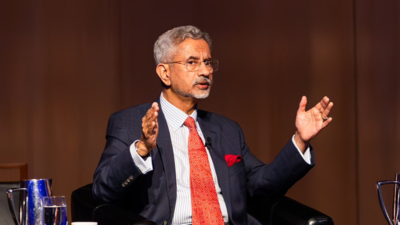[ad_1]
NEW DELHI: External affairs minister S Jaishankar has firmly pushed back against claims that the United States played a key role in brokering the recent ceasefire between India and Pakistan, asserting that it was India’s military actions that compelled Islamabad to halt hostilities. Speaking in an interview with a German Newspaper, Jaishankar also raised concerns over China’s deep defence ties with Pakistan, urging observers to “draw your own conclusions”.“The cessation of firing was agreed between the military commanders of both sides through direct contact,” Jaishankar said, adding, “The morning before, we effectively hit and incapacitated Pakistan’s main airbases and air defense system. So who should I thank for the cessation of hostilities? I thank the Indian military because it was the Indian military action that made Pakistan say: We are ready to stop.”Refuting the suggestion that the standoff brought the two nuclear-armed neighbours to the brink of atomic conflict, Jaishankar said, “Very, very far away. I’m frankly astonished by your question… At no point was a nuclear level reached.”He warned against perpetuating a narrative that any regional conflict in South Asia is a nuclear flashpoint, calling it “disturbing” and harmful as it “encourages terrible activities like terrorism.”On Pakistan’s role in fostering terrorism, Jaishankar was unambiguous: “Anyone who is not blind can see that the terrorist organizations are openly operating from the cities and towns of Pakistan… In Pakistan, terrorism is a very open business. A business that is supported, financed, organized and used by the state. And by their military.”Asked about whether China had a role in the India-Pakistan conflict, Jaishankar pointed to Pakistan’s weapons systems: “Many of the weapons systems that Pakistan has are of Chinese origin and the two countries are very close. You can draw your own conclusions from that.”Jaishankar’s comments came in the context of a broader conversation about India’s evolving foreign policy, its ties with Germany and the EU, and the country’s continued strategic partnership with Russia. While defending India’s ties with Moscow, Jaishankar pushed back against what he called European double standards.“You sound as if you can do business with states that are different, but we cannot… My neighbour Pakistan has caused every conceivable problem under the sun… But doesn’t Germany also do business with Pakistan?” he said.On Europe’s evolving foreign policy stance, he observed that the continent was slowly emerging from the assumption that its concerns automatically translate into global concerns. “I see big changes in Europe and Europe’s thinking… that it feels it should be more independent and more resilient,” he said.He also noted that Germany is beginning to take more responsibility for its security, and welcomed efforts to deepen Indo-German defence ties. However, he added that “the conditions are not yet perfect” and that India continues to push for greater technological and defence cooperation.On the stalled India-EU Free Trade Agreement, Jaishankar struck an optimistic note. “Prime Minister Modi and EU Commission President von der Leyen have made it clear that the project should be completed by the end of the year… The agreement has strategic importance.”Jaishankar expressed confidence in Germany’s growing engagement with Indo-Pacific security concerns and India’s perspective on threats posed by China. “When I look at Germany ten years ago, I see an enormous evolution… I see much stronger prospects for our partnership,” he said.
[ad_2]
Source link

